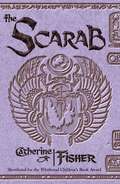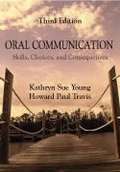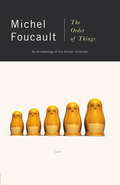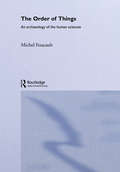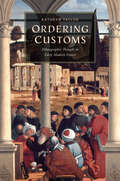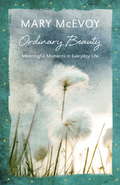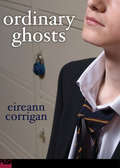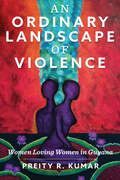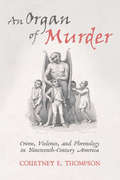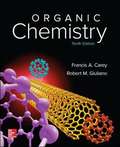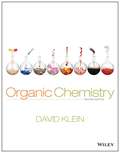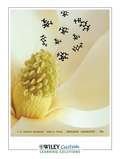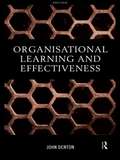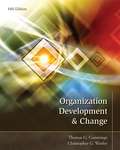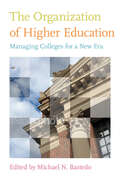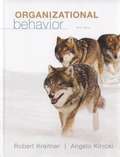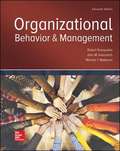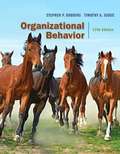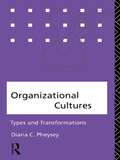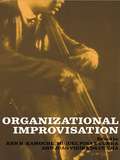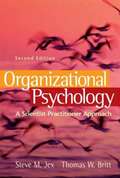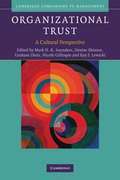- Table View
- List View
The Oracle Sequence: The Scarab
by Catherine FisherThe final story in the Oracle sequence.We are again in the distand land of deserts and islands ruled by one god whose wishes are conveyed through the Oracle. The Archon, child god-on-earth, returns from his journey across the desert to the Well of Songs, to find the tyrannical General Argelin has siezed control and his reign of madness is oppressing the Two Lands. He has publicly denounced the gods, and established a reign of terror. Mirany is in hiding, and the Nine are scattered. Will Argelin's obsession bring the Rain Queen's wrath down on them all? And whose is the sinister new power hidden in the sign of the Scarab? In the descent into anarchy, Mirany and the Archon must attempt the final, impossible journey of the soul. Through the Nine Gateways into death. And back.
Oral Communication: Skills, Choices, and Consequences
by Kathryn Sue Young Howard Paul TravisThis book is designed to help you recognize the importance of your words and actions in communication. The goals for this undergraduate communication textbook are to: (1) engage you to think about the skills, choices, and consequences of your communication; (2) create a book you will want to read; and (3) convince you that success can be yours if you make solid choices in your communication style.
The Order of Things: An Archaeology of Human Sciences (Routledge Classics)
by Michel FoucaultWith vast erudition, Foucault cuts across disciplines and reaches back into seventeenth century to show how classical systems of knowledge, which linked all of nature within a great chain of being and analogies between the stars in the heavens and the features in a human face, gave way to the modern sciences of biology, philology, and political economy. The result is nothing less than an archaeology of the sciences that unearths old patterns of meaning and reveals the shocking arbitrariness of our received truths. In the work that established him as the most important French thinker since Sartre, Michel Foucault offers startling evidence that "man"—man as a subject of scientific knowledge—is at best a recent invention, the result of a fundamental mutation in our culture.
The Order of Things: An Archaeology Of The Human Sciences (Routledge Classics)
by Michel FoucaultWhen one defines "order" as a sorting of priorities, it becomes beautifully clear as to what Foucault is doing here. With virtuoso showmanship, he weaves an intensely complex history of thought. He dips into literature, art, economics and even biology in The Order of Things, possibly one of the most significant, yet most overlooked, works of the twentieth century. Eclipsed by his later work on power and discourse, nonetheless it was The Order of Things that established Foucault's reputation as an intellectual giant. Pirouetting around the outer edge of language, Foucault unsettles the surface of literary writing. In describing the limitations of our usual taxonomies, he opens the door onto a whole new system of thought, one ripe with what he calls "exotic charm". Intellectual pyrotechnics from the master of critical thinking, this book is crucial reading for those who wish to gain insight into that odd beast called Postmodernism, and a must for any fan of Foucault.
Ordering Customs: Ethnographic Thought in Early Modern Venice (The Early Modern Exchange)
by Kathryn TaylorOrdering Customs explores how Renaissance Venetians sought to make sense of human difference in a period characterized by increasing global contact and a rapid acceleration of the circulation of information. Venice was at the center of both these developments. The book traces the emergence of a distinctive tradition of ethnographic writing that served as the basis for defining religious and cultural difference in new ways. Taylor draws on a trove of unpublished sources—diplomatic correspondence, court records, diaries, and inventories—to show that the study of customs, rituals, and ways of life not only became central in how Venetians sought to apprehend other peoples, but also had a very real impact at the level of policy, shaping how the Venetian state governed minority populations in the city and its empire. In contrast with the familiar image of ethnography as the product of overseas imperial and missionary encounters, the book points to a more complicated set of origins.
Ordinary Beauty: Meaningful Moments in Everyday Life
by Mary McEvoyActress and writer Mary McEvoy has struggled with depression for many years, trying to reconcile her life in the public eye with private pain. Many things have helped Mary to come to terms with her depression: the rituals of farming life in Co. Westmeath, the excitement of the stage, the love of friends and family. Ultimately, Mary has found her way through, and it's the little things that have really helped: the beauty of the world around her, the quiet pleasures of sweeping the yard, or cooking a simple meal.In Ordinary Beauty, Mary celebrates life's seemingly insignificant moments and invests them with fresh beauty and meaning, as well as a wry humour. Never has 'living in the moment' been so enjoyable, or so comforting.
Ordinary Ghosts
by Eireann CorriganFamily secrets and school secrets entwine in an engaging new novel from the author of You Remind Me of You, and Splintering.Sometimes when life haunts you, you're better off becoming the ghost. Emil Simon feels invisible enough. He counts as a nonentity at his elite preparatory school and makes barely a dent in his father's thoughts. When his older brother runs away, he entrusts Emil with a master key to Caramoor Academy. Soon Emil is sneaking into the school at night to explore ... and falling for a faculty daughter who sneaks in for reasons of her own. This is a novel about living with disappearances... and willing yourself to appear.
An Ordinary Landscape of Violence: Women Loving Women in Guyana (Critical Caribbean Studies)
by Preity R. KumarAn Ordinary Landscape of Violence: Women Loving Women in Guyana tells a new history of queer women in postcolonial Guyana. While the country has experienced a rise in queer activism, especially toward human rights efforts, members of the Guyanese queer community have also been victims of extreme violence. This book asks how a hetero-patriarchal state shapes queer and "women-lovin’ women’s" experiences, and how such women navigate racialized, sexualized, and homophobic violence. With a unique focus on the lives of queer women in Guyana, it reveals their manifold experiences of violence, explores regional differences, and shows their complicated understanding of what exactly constitutes “rights” and the limitations of those rights in their lives. While activism against violence is crucial, this book addresses not only the violence against women, but theorizes the intimate partner violence between women, and demonstrates the ways that violence is both racialized and sexualized.
An Organ of Murder: Crime, Violence, and Phrenology in Nineteenth-Century America (Critical Issues in Health and Medicine)
by Courtney E. ThompsonAn Organ of Murder explores the origins of both popular and elite theories of criminality in the nineteenth-century United States, focusing in particular on the influence of phrenology. In the United States, phrenology shaped the production of medico-legal knowledge around crime, the treatment of the criminal within prisons and in public discourse, and sociocultural expectations about the causes of crime. The criminal was phrenology’s ideal research and demonstration subject, and the courtroom and the prison were essential spaces for the staging of scientific expertise. In particular, phrenology constructed ways of looking as well as a language for identifying, understanding, and analyzing criminals and their actions. This work traces the long-lasting influence of phrenological visual culture and language in American culture, law, and medicine, as well as the practical uses of phrenology in courts, prisons, and daily life.
Organic Chemistry
by Francis A. Carey Robert M. GiulianoOrganic Chemistry has been designed to meet the needs of the "mainstream," two-semester, undergraduate organic chemistry course. This best-selling text gives students a solid understanding of organic chemistry by stressing how fundamental reaction mechanisms function and reactions occur.
Organic Chemistry
by David KleinThe textbook includes important concepts in Organic chemistry, complete with conceptual checkpoints that promote mastery of the concepts, and special emphasis is placed on skills development through Skill Builders to support these concepts.
Organic Chemistry 10th Edition
by T. W. Graham Solomons Craig B. FryhleThe Tenth Edition of Organic Chemistry continues Solomons/Fryhle's tradition of excellence in teaching and preparing students for success in the organic classroom and beyond. A central theme of the authors' approach to organic chemistry is to emphasize the relationship between structure and reactivity. To accomplish this, the text is organized in a way that combines the most useful features of a functional group approach with one largely based on reaction mechanisms. The authors' philosophy is to emphasize mechanisms and their common aspects as often as possible, and at the same time to use the unifying features of functional groups as the basis for most chapters. The structural aspects of the authors' approach show students what organic chemistry is. Mechanistic aspects of their approach show students how it works. And wherever an opportunity arises, the authors' show students what it does in living systems and the physical world around us. In the 10th edition, virtually every aspect of the teaching and learning solution has been revisited and redesigned to assist students in comprehending the fundamentals of organic chemistry. The authors' thoroughly explain and illustrate each new idea when it is first introduced and then reinforce the new idea or concept by having students work related problems.
Organic Chemistry 2nd Edition
by Jonathan Clayden Nick Greeves Stuart WarrenLike the first, the second edition is built on three principles: An explanatory approach, through which the reader is motivated to understand the subject and not just learn the facts; A mechanistic approach, giving the reader the power to understand compounds and reactions never previously encountered; An evidence-based approach, setting out clearly how and why reactions happen as they do, giving extra depth to the reader's understanding.
Organisational Learning and Effectiveness
by Denton JohnLearning is increasingly seen as crucial to the success of organisations but many studies of the subject offer very little empirical evidence to substantiate this. Based upon in-depth research, including over seventy interviews with managers and employees, Organisational Learning and Effectiveness is an original and comprehensive analysis of learning organisations. Contents include:* detailed case studies of five major international companies: Coca-Cola and Schweppes Beverages, 3M, Siebe, Mayflower and Morgan Crucible* the intellectual origins of organisational learning* best practice in organisational learning* the importance of leadership roles and skills*a critical examination of the usefulness and relevance of organisational learning and effectiveness.Integrating management theory and practice, this volume is an extremely valuable resource for all those with an interest in organisational behaviour and human resource development.
Organization Development and Change (Tenth Edition)
by Thomas G. Cummings Christopher G. WorleyMarket-leading ORGANIZATION DEVELOPMENT AND CHANGE, 10th Edition blends rigor and relevance in a comprehensive and clear presentation. The authors work from a strong theoretical foundation to describe, in practical terms, how behavioral science knowledge can be used to develop organizational strategies, structures, and processes.
The Organization of Higher Education: Managing Colleges for a New Era
by Michael N. BastedoColleges and universities are best understood as networks of departments working together to fulfill a mission of education, innovation, and community partnership. To better understand how these large and complex institutions function, scholars can apply organizational and strategic planning concepts made familiar by business management. This book follows that model and explores the new and emerging ways by which organizational theories address major contemporary concerns in higher education. The contributors to this volume are both influenced and inspired by the pioneering work of Marvin Peterson and his four-decade career researching higher education organization. Comprising a serious reexamination of the field, the essays review past and current thinking, address the field’s core theoretical traditions, and pursue exciting new lines of inquiry, including the organizational dynamics of diversity and social movement organizations. Ideal for courses in administration and theory, this book reinvigorates the study of higher education as an organization and encourages scholars to rediscover the value of organizational principles in all areas of higher education research. Contributors: Michael N. Bastedo, University of Michigan; Patricia J. Gumport, Stanford University; James C. Hearn, University of Georgia; Adrianna Kezar, University of Southern California; Jason Lane, State University of New York at Albany; Simon Marginson, University of Melbourne; Michael K. McLendon, Vanderbilt University; Anna Neumann, Columbia University; Brian Pusser, University of Virginia; Fabio Rojas, Indiana University; Daryl G. Smith, Claremont Graduate University; William G. Tierney, University of Southern California; and the late J. Douglas Toma, University of Georgia
Organizational Behavior
by Robert Kreitner Angelo KinickiIn its tradition of being an up-to-date, relevant and user-driven textbook, Kreitner and Kinicki's approach to organizational behavior is based on the authors' belief that reading a comprehensive textbook is hard work; however, the process should be interesting and sometimes even fun. The authors' commitment to continuous improvement makes complex ideas understandable through clear and concise explanations, contemporary examples, a visually appealing photo/art program, and/or learning exercises. The authors respond to user feedback by ensuring the text covers the very latest OB research and practices.
Organizational Behavior and Management (Eleventh Edition)
by Robert Konopaske John M. Ivancevich Michael T. MattesonOrganizational Behavior and Management, students involved participants in learning about behavior and management within work settings. This edition combines text, self-learning exercises, group participation exercises, and cases. These elements are directed at students interested in attempting to predict the behavior of people working in organizations.
Organizational Behavior (Seventeenth Edition)
by Stephen P. Robbins Timothy A. JudgeFor undergraduate and graduate courses in Organizational Behavior. Help Students Better Understand Their Behavioral and Interpersonal Skills Long considered the standard for all organizational behavior textbooks, Organizational Behavior provides the research you want, in the language you can understand. This text continues its tradition of making current, relevant research come alive for readers. The Seventeenth Edition has been thoroughly updated to reflect the most recent research and business events within the field of organizational behavior worldwide, while maintaining its hallmark features-clear writing style, cutting-edge content, and intuitive pedagogy. There's a reason why Robbins's textbooks have educated millions of individuals and have been translated into twenty languages-and it's because of a commitment that provides the kind of engaging, cutting-edge material that helps readers understand and connect with organizational behavior. Also Available with MyManagementLabTM MyManagementLab is an online homework, tutorial, and assessment program designed to work with this text to engage students and improve results. Within its structured environment, students practice what they learn, test their understanding, and pursue a personalized study plan that helps them better absorb course material and understand difficult concepts. NOTE: You are purchasing a standalone product; MyManagementLab does not come packaged with this content. If you would like to purchase both the physical text and MyManagementLab search for: 0134437861/ 9780134437866 Organizational Behavior Plus MyManagementLab with Pearson eText -- Access Card Package Package consists of: 013410398X / 9780134103983 Organizational Behavior 0134182189 / 9780134182186 MyManagementLab with Pearson eText--Access Card--for Organizational Behavior
Organizational Behavior (Sixteenth Edition)
by Stephen P. Robbins Timothy A. JudgeLong considered the standard for all organizational behavior textbooks, Organizational Behavior provides the research you want, in the language your students understand. This text continues its tradition of making current, relevant research come alive for students. The Sixteenth Edition has been thoroughly updated to reflect the most current recent research for Organizational Behavior, while maintaining its hallmark features –clear writing style, cutting-edge content, and engaging pedagogy. There’s a reason why Robbins textbooks have educated millions of students and have been translated into twenty languages—and it’s because of a commitment that provides the kind of engaging, cutting-edge material that helps students understand and connect with Organizational Behavior. For undergraduate and graduate courses in Organizational Behavior
Organizational Behavior v 1.1
by Talya Bauer Berrin ErdoganTwo leading researchers in Management, Talya Bauer and Berrin Erdogan, bring you a new Organizational Behavior textbook that bridges the gap between theory and practice with a distinct "experiential" approach. On average, a worker in the USA will change jobs 10 times in 20 years. In order to succeed in this type of career situation, individuals need to be armed with the tools necessary to be life-long learners. To that end, this book is not be about giving students all the answers to every situation they may encounter when they start their first job or as they continue up the career ladder.
Organizational Cultures: Types and Transformations
by Diana C. PheyseyFirst published in 1993. Routledge is an imprint of Taylor & Francis, an informa company.
Organizational Improvisation
by Miguel Pina Cunha Ken KamocheThe relatively new field of organizational improvisation is concerned with the pressures on organizations to react continually to today's ever-changing environment. Organizational improvisation has important implications for such subjects as product innovation, teamworking and organizational renewal, and this new book brings together some of the best and most thought-provoking papers published in recent years. This area is now emerging as one of the most important in organizational science, and this book provides a comprehensive collection suitable for students, researchers and practitioners alike.
Organizational Psychology: A Scientist-Practitioner Approach (Second Edition)
by Steve M. Jex Thomas W. BrittThorough and up-to-date coverage of both the science and practice of organizational psychology. This Second Edition reflects the latest developments and research in the field using a scientist-practitioner model that expertly integrates multicultural and international issues as it addresses the most current knowledge and topics in the practice of organizational psychology. Beginning with a foundation of research methodology, this text examines the behavior of individuals in organizational settings and shows readers how psychological models can be used to improve employee morale, productivity, and quality of service. Written in an accessible style that brings the material to life, author Steve Jex and new coauthor Thomas Britt use their experiences as consultants and educators to bring new features to the Second Edition, including: * Updated chapters, particularly those on job attitudes, teams, and leadership * New "People Behind the Research" and "Illuminating Examples" boxes * New coverage of workplace stress, teams, and multicultural socialization * More material on personal difference, personality, and considerations of diversity * Extended coverage of financial incentives and executive compensation * Using descriptive cases to illustrate workplace issues, Organizational Psychology, Second Edition thoroughly addresses the major motivational theories in organizational psychology and the mechanisms that organizations use to influence employees' behavior.
Organizational Trust: A Cultural Perspective
by Mark N. K. Saunders Denise Skinner Graham Dietz Nicole Gillespie Roy J. LewickiThe globalized nature of modern organizations presents new and intimidating challenges for effective relationship building. Organizations and their employees are increasingly being asked to manage unfamiliar relationships with unfamiliar parties. These relationships not only involve working across different national cultures, but also dealing with different organizational cultures, different professional cultures and even different internal constituencies. Managing such differences demands trust. This book brings together research findings on organizational trust-building across cultures. Established trust scholars from around the world consider the development and maintenance of trust between, for example, management consultants and their clients, senior international managers from different nationalities, different internal organizational groupings during times of change, international joint ventures, and service suppliers and the local communities they serve. These studies, set in a wide variety of national settings, are an important resource for academics, students and practitioners who wish to know more about the nature of cross-cultural trust-building in organizations.
